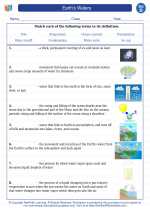Earth's Waters -> geological processes
Geological Processes
Geological processes are natural processes that shape the Earth's surface and structure over time. These processes include weathering, erosion, deposition, plate tectonics, and volcanic activity.
Weathering
Weathering is the breaking down of rocks and minerals on the Earth's surface into smaller pieces. There are two types of weathering: mechanical and chemical. Mechanical weathering involves the physical breakdown of rocks, while chemical weathering involves the breakdown of rocks through chemical reactions.
Erosion
Erosion is the process by which weathered rock and soil are moved from one place to another by natural forces such as wind, water, and ice. Erosion can create landforms such as valleys, canyons, and deltas.
Deposition
Deposition is the process by which eroded material is dropped or settles in a new location. This can lead to the formation of sedimentary rocks and landforms such as beaches and river deltas.
Plate Tectonics
Plate tectonics is the theory that the Earth's outer shell is divided into several plates that glide over the mantle. This movement can cause earthquakes, volcanic activity, and the formation of mountain ranges.
Volcanic Activity
Volcanic activity occurs when molten rock, ash, and gases escape from an opening in the Earth's crust. This can lead to the formation of new land, such as islands, and the release of gases and ash into the atmosphere.
Study Guide
- What are geological processes?
- Explain the difference between mechanical and chemical weathering.
- How does erosion shape the Earth's surface?
- Describe the process of deposition and provide examples of resulting landforms.
- What is plate tectonics and how does it impact the Earth's surface?
- Discuss the causes and effects of volcanic activity.
Understanding geological processes is important for understanding the Earth's history and the formation of its various landforms. By studying these processes, we can gain insight into the dynamic nature of the Earth and the forces that continue to shape it.
.◂Science Worksheets and Study Guides Fourth Grade. Earth's Waters
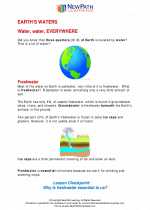
 Worksheet/Answer key
Worksheet/Answer key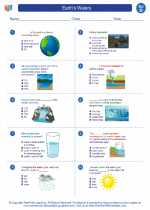
 Worksheet/Answer key
Worksheet/Answer key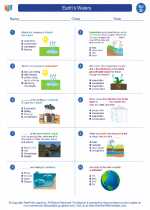
 Worksheet/Answer key
Worksheet/Answer key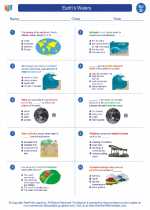
 Vocabulary/Answer key
Vocabulary/Answer key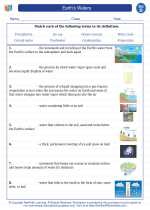
 Vocabulary/Answer key
Vocabulary/Answer key